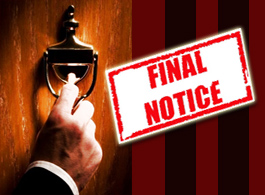Many small businesses are faced with the challenge of collecting money owed. This is one of the most important aspects of being in  business as delayed payments can seriously disrupt cash flow that keeps the business afloat. The amount of bill collectors advertising services on the web suggests that this is a big problem. Here are a few suggestions that can result in getting paid faster and with less hassle:
business as delayed payments can seriously disrupt cash flow that keeps the business afloat. The amount of bill collectors advertising services on the web suggests that this is a big problem. Here are a few suggestions that can result in getting paid faster and with less hassle:
- Written Agreement. Before starting work on any project, have a written agreement that is signed by both you and the client. This agreement states what you are going to do, what the fee will be, when you intend to deliver, and how the payment schedule is set up.
- Progress Billings. Consider sending progress bills if the work being performed will take longer than a couple of days. It is common to bill for one-third to one-half up front, one-third to a quarter at the midpoint, and the remainder on completion.
- Credit Check. If this is a sizable job, consider getting permission to check the credit history of the customer before deciding to extend credit to them. For corporations, use Dun & Bradstreet services to check their payment history. Even if their credit isn’t perfect, you can still do business with them. Modify the agreement in any way that makes you, as the business owner, more comfortable collecting monies from them.
- Interest Fees and Incentives. Charging interest fees on late payments is important because it adds urgency to the invoice. Be sure that late fees are addressed in the initial customer contact and is also restated on the invoice. Incentives can motivate customers to pay early. Incentives could include a 1 to 2 percent discount if payment is received within a specific “early” time frame. It rewards your customers for their business, increases their loyalty, and helps you get paid.
- Clearly Laid Out Invoices. Use “date due” vs. “net 30” terminology as sometimes customers do not know what “net 30” means. This erases any doubt about when the invoice needs to be paid. Also, does the customer need a PO number included? Do they need a detailed breakdown of services or will a general description suffice? Who do I direct the invoices to? What address do I send the invoice to? Finding out what the customer needs for billing purposes will save time and money down the road.
- Electronic Payment Options. Many times customers pay quicker if they are given the opportunity to pay electronically.
- Please and Thank You. It has been found that adding “please” and “thank you” to your invoices can improve the likelihood of getting paid by more than 5 percent. So practicing good etiquette can get you paid sooner!
No matter how careful a business is about collecting money owed, an allowance for bad debt is still needed. Sometimes there are circumstances beyond anyone’s control that can prevent payment. Anticipate anywhere from 2 to 5 percent loss to bad debt. It is important to set a schedule to deal with past due accounts.
When accounts are considered past due, say 35 days, start with a pleasant phone call. Find out if they received the invoice or maybe just forgot to pay it. Find out if there are any issues to prevent payment. Get a commitment from the person who is in a position to carry out that commitment. Listen to their problems but also be firm in your needs to be paid. If you still don’t get paid, you can choose to take a more aggressive stance yourself or involve a collection agency. Your choice will depend on the amount of the debt, how confident you are of the party’s ability to pay, and other information known about the customer.
Having a policy and sticking with it will increase the likelihood of being paid quicker. And that is good news for any business!
